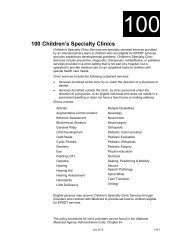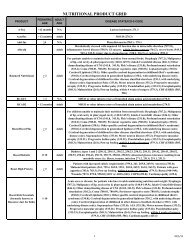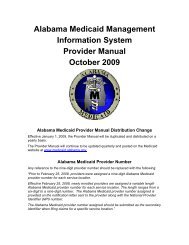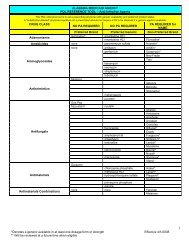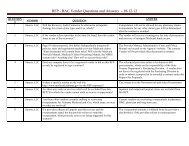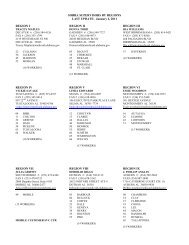Home and Community-Based Service for the Alabama
Home and Community-Based Service for the Alabama
Home and Community-Based Service for the Alabama
You also want an ePaper? Increase the reach of your titles
YUMPU automatically turns print PDFs into web optimized ePapers that Google loves.
TABLE OF CONTENTS<br />
CHAPTER FORTY-FOUR<br />
HOME AND COMMUNITY-BASED SERVICES<br />
FOR THE ALABAMA COMMUNITY TRANSITION (ACT) WAIVER<br />
RULE TITLE PAGE<br />
560-X-44-.01 Authority <strong>and</strong> Purpose 1<br />
560-X-44-.02 Eligibility 1<br />
560-X-44-.03 Operating Agencies 2<br />
560-X-44-.04 Covered <strong>Service</strong>s 2<br />
560-X-44-.05 Costs <strong>for</strong> <strong>Service</strong>s 9<br />
560-X-44-.06 Application Process 9<br />
560-X-44-.07 Fair Hearings 11<br />
560-X-44-.08 Payment Methodology <strong>for</strong> Covered <strong>Service</strong>s 11<br />
560-X-44-.09 Confidentiality 12<br />
560-X-44-.10 Records 12<br />
560-X-44-.11 <strong>Service</strong> Providers 13<br />
560-X-44-.12 Enrollment 13<br />
i
Chapter 44. <strong>Home</strong> <strong>and</strong> <strong>Community</strong>-<strong>Based</strong> <strong>Service</strong>s (HCBS) <strong>for</strong> <strong>the</strong> <strong>Alabama</strong><br />
<strong>Community</strong> Transition (ACT) Waiver<br />
Rule No. 560-X-44-.01. Authority <strong>and</strong> Purpose<br />
(1) <strong>Home</strong> <strong>and</strong> <strong>Community</strong>-<strong>Based</strong> <strong>Service</strong>s <strong>for</strong> <strong>the</strong> ACT Waiver are provided by<br />
<strong>the</strong> <strong>Alabama</strong> Medicaid Agency to disabled individuals who would o<strong>the</strong>rwise require<br />
institutionalization in a nursing facility. These services are provided through a Medicaid<br />
waiver under <strong>the</strong> provisions of Section 1915(c) of <strong>the</strong> Social Security Act <strong>for</strong> an initial<br />
period of five years <strong>and</strong> <strong>for</strong> five year periods <strong>the</strong>reafter upon renewal of <strong>the</strong> waiver by <strong>the</strong><br />
Centers <strong>for</strong> Medicare <strong>and</strong> Medicaid <strong>Service</strong>s.<br />
(2) The purpose of <strong>the</strong> ACT Waiver is to enable individuals, who currently<br />
reside in a nursing facility, <strong>the</strong> opportunity to transition out of <strong>the</strong> facility <strong>and</strong> receive<br />
home <strong>and</strong> community based services in <strong>the</strong> community. A second target population<br />
would be individuals currently being served on one of <strong>Alabama</strong>’s o<strong>the</strong>r HCBS waivers<br />
whose condition is such that <strong>the</strong>ir current waiver is not meeting <strong>the</strong>ir needs <strong>and</strong> admission<br />
to an institution is eminent if <strong>the</strong> ACT Waiver were not an option to better serve <strong>the</strong>ir<br />
needs.<br />
Author: Ginger Wettingfeld, Associate Director, LTC Project Development Unit.<br />
Statutory Authority: Section 1915(c) Social Security Act; 42 CFR 441, Subpart G.<br />
History: New Rule: Filed February 10, 2012; effective March 16, 2012.<br />
Rule No. 560-X-44-.02. Eligibility<br />
(1) Financial eligibility is limited to those individuals receiving SSI, individuals<br />
receiving State Supplementation, SSI related protected groups deemed to be eligible <strong>for</strong><br />
SSI/Medicaid, <strong>and</strong> Special <strong>Home</strong> <strong>and</strong> <strong>Community</strong>-<strong>Based</strong> waiver disabled individuals<br />
whose income is not greater than 300% of <strong>the</strong> SSI Federal Benefit Rate.<br />
(2) Medical eligibility is determined based on current admission criteria <strong>for</strong><br />
nursing facility level of care as described in Rule No. 560-X-10-.10.<br />
(3) The <strong>Alabama</strong> Medicaid Agency or its operating agency, <strong>the</strong> <strong>Alabama</strong><br />
Department of Rehabilitation <strong>Service</strong>s (ADRS), acting on Medicaid’s behalf may deny<br />
home <strong>and</strong> community-based services if:<br />
(a) If it is determined that an individual’s health <strong>and</strong> safety is at risk in <strong>the</strong><br />
community;<br />
(b) The cost of serving an individual on <strong>the</strong> waiver exceeds <strong>the</strong> cost of<br />
caring <strong>for</strong> that individual in a nursing facility;<br />
(c) The individual does not cooperate with a provider in <strong>the</strong> provision of<br />
services;<br />
(d) The individual does not meet <strong>the</strong> goals <strong>and</strong> objectives of being on <strong>the</strong><br />
waiver program.<br />
1
(4) The <strong>Alabama</strong> Medicaid Agency is restricted by <strong>the</strong> waiver to serving <strong>the</strong><br />
estimated annual unduplicated number of beneficiaries approved by <strong>the</strong> Centers <strong>for</strong><br />
Medicare <strong>and</strong> Medicaid <strong>Service</strong>s.<br />
Author: Ginger Wettingfeld, Associate Director, LTC Project Development Unit.<br />
Statutory Authority: 42 CFR Section 441, Subpart G <strong>and</strong> <strong>the</strong> <strong>Home</strong> <strong>and</strong> <strong>Community</strong>-<br />
<strong>Based</strong> ACT Waiver<br />
History: New Rule: Filed February 10, 2012; effective March 16, 2012.<br />
Rule No. 560-X-44-.03. Operating Agencies<br />
The <strong>Home</strong> <strong>and</strong> <strong>Community</strong>-<strong>Based</strong> <strong>Service</strong>s ACT Waiver is a cooperative ef<strong>for</strong>t<br />
between <strong>the</strong> <strong>Alabama</strong> Medicaid Agency <strong>and</strong> <strong>the</strong> ADRS.<br />
Author: Ginger Wettingfeld, Associate Director, LTC Project Development Unit.<br />
Statutory Authority: The <strong>Home</strong> <strong>and</strong> <strong>Community</strong>-<strong>Based</strong> <strong>Service</strong>s ACT Waiver<br />
History: New Rule: Filed February 10, 2012; effective March 16, 2012.<br />
Rule No. 560-X-44-.04. Covered <strong>Service</strong>s<br />
(1) <strong>Community</strong> Case Management <strong>Service</strong>s<br />
(a) <strong>Community</strong> Case Management is a comprehensive system of providing<br />
services which will assist waiver recipients in gaining needed waiver <strong>and</strong> o<strong>the</strong>r state plan<br />
services, as well as needed medical, social, educational, <strong>and</strong> o<strong>the</strong>r appropriate services,<br />
regardless of <strong>the</strong> funding source <strong>for</strong> <strong>the</strong> services to which access is gained. <strong>Community</strong><br />
Case Management services may be used to locate, coordinate, <strong>and</strong> monitor necessary <strong>and</strong><br />
appropriate services. <strong>Community</strong> Case Management activities will also be used to assist<br />
in <strong>the</strong> transition of an individual from an institutional setting to <strong>the</strong> community.<br />
<strong>Community</strong> Case Management activities to facilitate transition are limited to a maximum<br />
of 180 days prior to discharge into <strong>the</strong> community.<br />
(b) Case managers are responsible <strong>for</strong> Plan of Care development <strong>and</strong><br />
ongoing monitoring of <strong>the</strong> provision of waiver services <strong>and</strong> non-waiver services included<br />
in <strong>the</strong> recipient’s Plan of Care.<br />
(c) Case management will be provided by a case manager employed by or<br />
under contract with <strong>the</strong> ADRS.<br />
(2) Personal Care <strong>Service</strong>s<br />
(a) Personal care services are services that provide assistance with eating,<br />
bathing, dressing, personal hygiene <strong>and</strong> activities of daily living. <strong>Service</strong>s may include<br />
assistance with preparation of meals but do not include <strong>the</strong> cost of meals <strong>the</strong>mselves.<br />
When specified in <strong>the</strong> Plan of Care, this service may also include such housekeeping<br />
chores as bed making, dusting <strong>and</strong> vacuuming, which are incidental to <strong>the</strong> care furnished,<br />
or which are essential to <strong>the</strong> health <strong>and</strong> welfare of <strong>the</strong> individual, ra<strong>the</strong>r than <strong>the</strong><br />
individual’s family. Personal care providers must meet State st<strong>and</strong>ards <strong>for</strong> this service.<br />
(b) Personal care services will be provided by individuals employed by a<br />
certified <strong>Home</strong> Health Agency or o<strong>the</strong>r health care agencies approved by <strong>the</strong><br />
2
Commissioner of <strong>the</strong> <strong>Alabama</strong> Medicaid Agency <strong>and</strong> supervised by a case manager.<br />
Persons providing personal care services must meet <strong>the</strong> qualifications of a personal care<br />
attendant <strong>and</strong> meet provider per<strong>for</strong>mance st<strong>and</strong>ards.<br />
(c) Personal care services may be provided by family members or friends<br />
only if a lack of o<strong>the</strong>r qualified providers in applicable remote areas exists.<br />
(d) <strong>Service</strong>s provided to each client are dependent on individual need as set<br />
<strong>for</strong>th in <strong>the</strong> client’s Plan of Care.<br />
(3) <strong>Home</strong> Modifications (Environmental Accessibility Adaptations - EAA)<br />
(a) Environmental accessibility adaptations provide those physical<br />
adaptations to <strong>the</strong> home required by <strong>the</strong> individual’s Plan of Care which are necessary to<br />
ensure <strong>the</strong> health, welfare, <strong>and</strong> safety of <strong>the</strong> individual or which enable <strong>the</strong> individual to<br />
function with greater independence in <strong>the</strong> home <strong>and</strong> without which <strong>the</strong> individual would<br />
require institutionalization.<br />
(b) Adaptations may include <strong>the</strong> installation of ramps <strong>and</strong> grab-bars <strong>and</strong>/or<br />
<strong>the</strong> widening of doorways in order to accommodate <strong>the</strong> medical equipment <strong>and</strong> supplies<br />
which are necessary <strong>for</strong> <strong>the</strong> welfare of <strong>the</strong> individual. Excluded are those adaptations or<br />
improvements to <strong>the</strong> home which are not of direct medical or remedial benefit to <strong>the</strong><br />
waiver client, such as floor covering, roof repair, central air conditioning, etc.<br />
Adaptations which add to <strong>the</strong> total square footage of <strong>the</strong> home, any type of construction<br />
affecting <strong>the</strong> structural integrity of <strong>the</strong> home, changes to <strong>the</strong> existing electrical<br />
components of <strong>the</strong> home or permanent adaptations to rental property are excluded from<br />
this benefit. All services shall be provided in accordance with applicable state or local<br />
building codes.<br />
(c) Environmental accessibility adaptations will be provided by individuals<br />
capable of constructing or installing <strong>the</strong> needed apparatus. Any construction/installation<br />
completed must be in accordance with state <strong>and</strong> local building codes.<br />
(d) Environmental accessibility adaptations must be prior authorized <strong>and</strong><br />
approved by <strong>the</strong> <strong>Alabama</strong> Medicaid Agency or its designee <strong>for</strong> prior authorization <strong>and</strong><br />
must be listed on <strong>the</strong> client’s Plan of Care. Any expenditure in excess of <strong>the</strong> maximum<br />
allowed amount must be approved by <strong>the</strong> State Coordinator <strong>and</strong> <strong>the</strong> Medicaid designated<br />
personnel.<br />
(e) The service also may be provided to assist <strong>the</strong> individual transitioning<br />
from an institution to <strong>the</strong> ACT Waiver, but should not be billed until <strong>the</strong> first day <strong>the</strong><br />
client is active on <strong>the</strong> waiver.<br />
(f) Limits on <strong>Home</strong> Modifications (EAA) are $5,000 per waiver<br />
participant <strong>for</strong> <strong>the</strong> entire stay on <strong>the</strong> waiver.<br />
(4) Personal Emergency Response System<br />
(a) Personal Emergency Response System (PERS) is an electronic service<br />
which enables certain high-risk patients to secure help in <strong>the</strong> event of an emergency. The<br />
client may also wear a portable "help" button which allows <strong>the</strong> client flexibility in<br />
mobility. The system is connected to a patient's phone <strong>and</strong> programmed to signal a<br />
response center once a patient's "help" button is activated.<br />
3
(b) PERS must be provided by trained professionals. The PERS staff must<br />
complete a two-week training period <strong>for</strong> familiarization with <strong>the</strong> monitoring system <strong>and</strong><br />
proper protocol to provide appropriate response action.<br />
(c) Initial setup <strong>and</strong> installation of PERS must be on <strong>the</strong> individual’s Plan<br />
of Care, prior authorized <strong>and</strong> approved by <strong>the</strong> <strong>Alabama</strong> Medicaid Agency or its designee.<br />
(d) The service also may be provided to assist <strong>the</strong> individual transitioning<br />
from an institution to <strong>the</strong> ACT Waiver, but should not be billed until <strong>the</strong> first day <strong>the</strong><br />
client is active on <strong>the</strong> waiver.<br />
(5) Medical Supplies<br />
(a) Medical supplies include: devices, controls, or appliances, specified in<br />
<strong>the</strong> Plan of Care, which enable individuals to increase <strong>the</strong>ir ability to per<strong>for</strong>m activities of<br />
daily living, to maintain health <strong>and</strong> safety in <strong>the</strong> home environment, or to perceive,<br />
control, or communicate with <strong>the</strong> environment in which <strong>the</strong>y live. All waiver medical<br />
supplies must be prescribed by a physician, be medically necessary <strong>and</strong> be specified in<br />
<strong>the</strong> Plan of Care.<br />
(b) Providers of this service will be only those who have signed provider<br />
agreements with <strong>the</strong> <strong>Alabama</strong> Medicaid Agency <strong>and</strong> <strong>the</strong> ADRS.<br />
(c) Medical supplies service shall not exceed $1,800.00 annually per<br />
recipient.<br />
(6) Assistive Technology<br />
(a) Assistive technology includes devices, pieces of equipment or products<br />
that are modified or customized which are used to increase, maintain or improve<br />
functional capabilities of individuals with disabilities. It also includes any service that<br />
directly assists an individual with a disability in <strong>the</strong> selection, acquisition or use of an<br />
assistive technology device. Such services may include evaluation of need, acquisition,<br />
selection, design, fitting, customizing, adaptation, application, etc. This service must be<br />
listed on <strong>the</strong> individual’s Plan of Care. Items reimbursed with waiver funds shall be in<br />
addition to any medical equipment furnished under <strong>the</strong> State Plan <strong>and</strong> shall exclude those<br />
items which are not of direct medical or remedial benefit to <strong>the</strong> recipient.<br />
(b) The service must be medically necessary to prevent institutionalization<br />
or to assist an individual to transition from an institutional level of care to <strong>the</strong> ACT<br />
Waiver. If <strong>the</strong> individual fails to transition to <strong>the</strong> ACT Waiver, reimbursement will be at<br />
<strong>the</strong> administrative rate. All items shall meet applicable st<strong>and</strong>ards of manufacture, design<br />
<strong>and</strong> installation.<br />
(c) Assistive technology <strong>and</strong> transitional assistive technology services<br />
must be prior authorized <strong>and</strong> approved by <strong>the</strong> <strong>Alabama</strong> Medicaid Agency, or its designee<br />
<strong>and</strong> must be listed on <strong>the</strong> client’s Plan of Care.<br />
(d) Assistive technology services will be provided by licensed individuals<br />
or businesses capable of supplying <strong>the</strong> needed equipment <strong>and</strong>/or supplies. Assistive<br />
technology must be approved by <strong>the</strong> <strong>Alabama</strong> Medicaid Agency <strong>and</strong> must be listed in <strong>the</strong><br />
individual's Plan of Care.<br />
(e) Providers of this service will be those who meet provider qualifications<br />
<strong>and</strong> who have a signed provider agreement with <strong>the</strong> ADRS. Upon completion of <strong>the</strong><br />
service, <strong>the</strong> client must sign <strong>and</strong> date a <strong>for</strong>m acknowledging receipt of <strong>the</strong> service.<br />
4
(f) Assistive Technology has a cumulative limit of $15,000 per recipient<br />
per lifetime. This includes: purchase, repair, <strong>and</strong>/or evaluation.<br />
(g) The service may also be provided to assist <strong>the</strong> individual transitioning<br />
from an institution to <strong>the</strong> ACT Waiver, but should not be billed until <strong>the</strong> first day <strong>the</strong><br />
client is active on <strong>the</strong> waiver.<br />
(7) Assistive Technology Repairs<br />
(a) Assistive technology repairs will provide <strong>for</strong> <strong>the</strong> repair of devices,<br />
equipment, or products that were previously purchased by <strong>the</strong> <strong>Alabama</strong> Medicaid Agency<br />
<strong>for</strong> <strong>the</strong> recipient. Repairs include replacement of parts or batteries to allow <strong>the</strong> equipment<br />
to operate.<br />
(b) The provider should be responsible <strong>for</strong> replacement or repair of <strong>the</strong><br />
equipment or any part <strong>the</strong>reof that is found to be non-functional because of faulty<br />
material or workmanship within <strong>the</strong> guarantee of <strong>the</strong> manufacturer without any charge to<br />
<strong>the</strong> recipient or <strong>the</strong> ADRS. Only repairs outside <strong>the</strong> warranty period will be eligible <strong>for</strong><br />
reimbursement.<br />
(c) Businesses providing this service will possess a business license <strong>and</strong><br />
also be required to give a guarantee on work per<strong>for</strong>med.<br />
(d) This service must be listed on <strong>the</strong> recipient Plan of Care be<strong>for</strong>e being<br />
provided.<br />
(e) Assistive Technology has a cumulative limit of $15,000 per recipient<br />
per lifetime. This includes: purchase, repair, <strong>and</strong>/or evaluation.<br />
(8) Evaluation <strong>for</strong> Assistive Technology<br />
(a) Evaluation <strong>for</strong> assistive technology will provide evaluations <strong>and</strong><br />
determinations of a client’s needs <strong>for</strong> equipment prescribed by a physician to promote<br />
health, safety, <strong>and</strong> prevent institutionalization or to assist an individual to transition from<br />
an institution to <strong>the</strong> ACT Waiver. If <strong>the</strong> individual fails to transition to <strong>the</strong> ACT Waiver,<br />
reimbursement will be at <strong>the</strong> administrative rate.<br />
(b) The individual providing evaluation must be a physical <strong>the</strong>rapist<br />
licensed to do business in <strong>the</strong> state of <strong>Alabama</strong> <strong>and</strong> enrolled as a provider with <strong>the</strong><br />
ADRS. The physical <strong>the</strong>rapist should not have any financial or o<strong>the</strong>r affiliation with a<br />
vendor, manufacturer, or manufacturer’s representative of assistive technology<br />
equipment/devices.<br />
(c) A written copy of <strong>the</strong> physical <strong>the</strong>rapist’s evaluation must accompany<br />
<strong>the</strong> prior authorization request <strong>and</strong> a copy must be kept in <strong>the</strong> recipient’s file. This<br />
service must be listed on <strong>the</strong> recipient’s Plan of Care be<strong>for</strong>e being provided.<br />
(d) Assistive Technology has a cumulative limit of $15,000 per recipient<br />
per lifetime. This includes: purchase, repair, <strong>and</strong>/or evaluation.<br />
(9) Personal Assistance/Attendant <strong>Service</strong><br />
(a) Personal Assistance/Attendant <strong>Service</strong>s (PAS) are a range of services<br />
provided by one or more persons designed to assist an individual with a disability to<br />
per<strong>for</strong>m daily activities on <strong>and</strong> off <strong>the</strong> job. These activities would be per<strong>for</strong>med by <strong>the</strong><br />
individual if that person did not have a disability. Such services shall be designed to<br />
increase <strong>the</strong> individual’s independence <strong>and</strong> ability to per<strong>for</strong>m everyday activities. This<br />
5
service will support that population of individuals with physical disabilities who need<br />
services beyond personal care <strong>and</strong> primarily those seeking competitive employment<br />
ei<strong>the</strong>r in <strong>the</strong>ir home or in an integrated work setting.<br />
(b) Personal Assistance/Attendant <strong>Service</strong>s will be provided by a personal<br />
care attendant under <strong>the</strong> supervision of a registered nurse who meets <strong>the</strong> Personal<br />
Assistance/Attendant <strong>Service</strong> staffing requirements. Individuals providing personal care<br />
services must meet <strong>the</strong> qualifications of a personal care attendant <strong>and</strong> meet provider<br />
per<strong>for</strong>mance st<strong>and</strong>ards.<br />
(c) Personal Assistance/Attendant <strong>Service</strong>s may be provided by family<br />
members or friends only if <strong>the</strong>re is a lack of o<strong>the</strong>r qualified providers in remote areas.<br />
(10) Adult Day Health <strong>Service</strong>s<br />
(a) Adult Day Health <strong>Service</strong> provides social <strong>and</strong> health care in a<br />
community facility approved to provide such care. Health education, self-care training,<br />
<strong>the</strong>rapeutic activities, <strong>and</strong> health screening shall be included in <strong>the</strong> program.<br />
(b) Adult Day Health <strong>Service</strong> is provided by facilities that meet <strong>the</strong><br />
minimum st<strong>and</strong>ards <strong>for</strong> Adult Day Health Centers. The state agencies contracting <strong>for</strong><br />
Adult Day Health <strong>Service</strong>s must determine that each facility providing Adult Day Health<br />
<strong>Service</strong>s meets <strong>the</strong> prescribed st<strong>and</strong>ards.<br />
(c) Medicaid will not reimburse <strong>for</strong> activities per<strong>for</strong>med which are not<br />
within <strong>the</strong> scope of services.<br />
(d) No payment will be made <strong>for</strong> services not listed on <strong>the</strong> Plan of Care<br />
<strong>and</strong> <strong>the</strong> <strong>Service</strong> Authorization Form. Payments rendered <strong>for</strong> services not present on <strong>the</strong><br />
individual’s care plan will be recovered.<br />
(11) Respite Care<br />
(a) Respite care is given to individuals unable to care <strong>for</strong> <strong>the</strong>mselves on a<br />
short-term basis because of <strong>the</strong> absence or need <strong>for</strong> relief of those persons normally<br />
providing <strong>the</strong> care. Respite care is provided in <strong>the</strong> individual's home <strong>and</strong> includes<br />
supervision, companionship <strong>and</strong> personal care of <strong>the</strong> individual. Respite is intended to<br />
supplement not replace care provided to waiver clients. Respite is not an entitlement. It<br />
is based on <strong>the</strong> needs of <strong>the</strong> individual client <strong>and</strong> <strong>the</strong> care provided by <strong>the</strong> primary<br />
caregiver.<br />
(b) Respite care may be provided by a companion/sitter, personal care<br />
attendant, home health aide, homemaker, LPN or RN, depending upon <strong>the</strong> care needs of<br />
<strong>the</strong> individual. All o<strong>the</strong>r waiver services except case management will be discontinued<br />
during <strong>the</strong> time in-home respite is being provided.<br />
(c) Medicaid will not reimburse <strong>for</strong> activities per<strong>for</strong>med which are not<br />
within <strong>the</strong> scope of services.<br />
(d) No payment will be made <strong>for</strong> services not documented on <strong>the</strong> Plan of<br />
Care <strong>and</strong> <strong>the</strong> <strong>Service</strong> Authorization Form. Payments rendered <strong>for</strong> services not present on<br />
<strong>the</strong> individual’s care plan will be recovered.<br />
(12) Adult Companion <strong>Service</strong>s<br />
(a) Adult Companion service is non-medical assistance, observation,<br />
supervision <strong>and</strong> socialization, provided to a functionally impaired adult. Companions<br />
6
may provide limited assistance or supervise <strong>the</strong> individual with such tasks as: activities<br />
of daily living, meal preparation, laundry <strong>and</strong> shopping, but do not per<strong>for</strong>m <strong>the</strong>se<br />
activities as discrete services. The Companion may also per<strong>for</strong>m housekeeping tasks<br />
which are incidental to <strong>the</strong> care <strong>and</strong> supervision of <strong>the</strong> individual. Companion service is<br />
provided in accordance with a <strong>the</strong>rapeutic goal as stated in <strong>the</strong> Plan of Care, <strong>and</strong> is not<br />
purely diversional in nature. The <strong>the</strong>rapeutic goals may be related to client safety <strong>and</strong>/or<br />
toward promoting client independence or toward promoting <strong>the</strong> mental or emotional<br />
health of <strong>the</strong> client.<br />
(b) O<strong>the</strong>r service definitions include accompanying a client to a medical<br />
appointment, grocery shopping or picking up prescription medications. The companion<br />
service is available to only those clients living alone. Companion services cannot be<br />
provided at <strong>the</strong> same time as o<strong>the</strong>r approved waiver services with <strong>the</strong> exception of case<br />
management services. Companion services must not exceed four hours daily.<br />
(c) Medicaid will not reimburse <strong>for</strong> activities per<strong>for</strong>med which are not<br />
within <strong>the</strong> scope of services.<br />
(d) Companion service is not an entitlement. It is based on <strong>the</strong> needs of <strong>the</strong><br />
individual client.<br />
(e) No payment will be made <strong>for</strong> services not documented on <strong>the</strong> Plan of<br />
Care <strong>and</strong> <strong>the</strong> <strong>Service</strong> Authorization Form. Payments rendered <strong>for</strong> services not present on<br />
<strong>the</strong> care plan shall be recovered.<br />
(13) <strong>Home</strong> Delivered Meals<br />
(a) <strong>Home</strong> delivered meals are provided to an eligible individual who is<br />
unable to meet his/her nutritional needs. It must be determined that <strong>the</strong> nutritional needs<br />
of <strong>the</strong> individual can be addressed by <strong>the</strong> provision of home-delivered meals.<br />
(b) This service will provide at least one nutritionally sound meal per day<br />
to adults unable to care <strong>for</strong> <strong>the</strong>ir nutritional needs because of a functional<br />
disability/dependency <strong>and</strong> who require nutritional assistance to remain in <strong>the</strong> community,<br />
<strong>and</strong> do not have a caregiver available to prepare a meal <strong>for</strong> <strong>the</strong>m.<br />
(c) This service will be provided as specified in <strong>the</strong> Plan of Care <strong>and</strong> may<br />
include seven or 14 frozen meals per week. Clients will be authorized to receive one unit<br />
of service per week. One unit of service is a seven-pack of frozen meals. Clients may be<br />
authorized to receive two units of service per week. These clients will receive two sevenpacks<br />
of frozen meals or one seven-pack of frozen meals <strong>and</strong> one seven-pack of breakfast<br />
meals.<br />
(d) In addition to <strong>the</strong> frozen meals, <strong>the</strong> service may include <strong>the</strong> provision of<br />
two or more shelf-stable meals (not to exceed six meals per six-month period) to meet<br />
emergency nutritional needs when authorized in <strong>the</strong> recipient’s Plan of Care.<br />
(e) One frozen meal will be provided on days a client attends <strong>the</strong> Adult<br />
Day Health Centers. Meals provided, as part of this service, shall not constitute a “full<br />
nutritional regimen (three meals per day)”.<br />
(f) All menus must be reviewed <strong>and</strong> approved by a Registered Dietitian<br />
with licensure to practice in <strong>the</strong> State of <strong>Alabama</strong>.<br />
(g) The meals must be prepared <strong>and</strong>/or packaged, h<strong>and</strong>led, transported,<br />
served, <strong>and</strong> delivered according all applicable health, fire, safety, <strong>and</strong> sanitation<br />
regulations.<br />
7
(h) No payment will be made <strong>for</strong> services not documented on <strong>the</strong> Plan of<br />
Care <strong>and</strong> <strong>the</strong> <strong>Service</strong> Authorization Form. Payments rendered <strong>for</strong> services not<br />
documented on <strong>the</strong> individual’s care plan will be recouped.<br />
(i) During times of <strong>the</strong> year when <strong>the</strong> State is at an increased risk of<br />
disaster from hurricanes, tornadoes, or ice/snow conditions, <strong>the</strong> meals vendor will be<br />
required to maintain, at a minimum, a sufficient inventory to operate all frozen meals<br />
delivery routes <strong>for</strong> two days. In <strong>the</strong> event of an expected storm or disaster, <strong>the</strong> Meals<br />
Coordinator will authorize implementation of a Medicaid approved Disaster Meal<br />
<strong>Service</strong>s Plan.<br />
(14) <strong>Home</strong>maker <strong>Service</strong>s.<br />
(a) <strong>Home</strong>maker services are general household activities that include meal<br />
preparation, food shopping, routine cleaning, <strong>and</strong> personal services. They are provided<br />
by a trained homemaker when <strong>the</strong> individual regularly responsible <strong>for</strong> <strong>the</strong>se activities is<br />
temporarily absent or unable to manage <strong>the</strong> home <strong>and</strong> care <strong>for</strong> <strong>the</strong> recipient.<br />
(b) A person providing homemaker services must meet <strong>the</strong> qualifications<br />
of a <strong>Home</strong>maker Attendant as specified in <strong>the</strong> approved waiver document.<br />
(c) Medicaid will not reimburse <strong>for</strong> activities per<strong>for</strong>med which are not<br />
within <strong>the</strong> scope of services.<br />
(d) No payment will be made <strong>for</strong> services not documented on <strong>the</strong> Plan of<br />
Care <strong>and</strong> <strong>the</strong> <strong>Service</strong> Authorization Form. Payments rendered <strong>for</strong> services not present on<br />
<strong>the</strong> individual’s Plan of Care will be recovered.<br />
(15) Skilled Nursing<br />
(a) The Skilled Nursing service is a service which provides skilled medical<br />
observation <strong>and</strong> nursing services per<strong>for</strong>med by a Registered Nurse or Licensed Practical<br />
Nurse who will per<strong>for</strong>m <strong>the</strong>ir duties in compliance with <strong>the</strong> <strong>Alabama</strong> Nurse Practice Act<br />
<strong>and</strong> <strong>the</strong> <strong>Alabama</strong> State Board of Nursing.<br />
(b) Skilled nursing under <strong>the</strong> waiver will not duplicate skilled nursing<br />
under <strong>the</strong> m<strong>and</strong>atory home health benefit in <strong>the</strong> State Plan. If a waiver client meets <strong>the</strong><br />
criteria to receive <strong>the</strong> home health benefits, home health should be utilized first <strong>and</strong><br />
exhausted be<strong>for</strong>e Skilled Nursing under <strong>the</strong> waiver is utilized.<br />
(16) Transitional Assistance <strong>Service</strong><br />
(a) Transitional Assistance service is a service that will assist with <strong>the</strong><br />
expense of transitioning from a nursing facility to <strong>the</strong> community.<br />
(b) Examples of expenses may include: deposits <strong>for</strong> utilities, pest<br />
eradication, one-time cleaning prior to occupancy, essential household furnishings, <strong>and</strong><br />
moving expenses.<br />
(c) Transitional Assistance <strong>Service</strong> cannot exceed $1,500.<br />
(d) This service may be provided to <strong>the</strong> client prior to transition from <strong>the</strong><br />
institution, <strong>the</strong> service should not be billed until <strong>the</strong> first day <strong>the</strong> client is active on <strong>the</strong><br />
waiver.<br />
ACT Waiver services provided to assist an individual to transition to <strong>the</strong> community shall<br />
be billed once <strong>the</strong> client has been successfully transitioned to <strong>the</strong> community. If <strong>the</strong><br />
8
individual fails to transition to <strong>the</strong> ACT Waiver, reimbursement will be at <strong>the</strong><br />
administrative rate <strong>and</strong> not <strong>the</strong> service rate.<br />
Author: Mattie M. Jackson, Program Manager, LTC Program Management Unit.<br />
Statutory Authority: 42 CFR Section 441, Subpart G <strong>and</strong> <strong>the</strong> <strong>Home</strong> <strong>and</strong> <strong>Community</strong>-<br />
<strong>Based</strong> ACT Waiver.<br />
History: New Rule: Filed February 10, 2012; effective March 16, 2012. Amended:<br />
Filed June 12, 2012; effective July 17, 2012.<br />
Rule No. 560-X-44-.05. Costs <strong>for</strong> <strong>Service</strong>s<br />
The costs <strong>for</strong> services to individuals who qualify <strong>for</strong> home <strong>and</strong> community-based<br />
care under <strong>the</strong> waiver program will not exceed, on an average per capita basis, <strong>the</strong> total<br />
expenditures that would be incurred <strong>for</strong> such individuals if home <strong>and</strong> community-based<br />
services were not available.<br />
Author: Ginger Wettingfeld, Associate Director, LTC Project Development Unit.<br />
Statutory Authority: 42 CFR Section 441, Subpart G <strong>and</strong> <strong>the</strong> <strong>Home</strong> <strong>and</strong> <strong>Community</strong>-<br />
<strong>Based</strong> ACT Waiver.<br />
History: New Rule: Filed February 10, 2012; effective March 16, 2012.<br />
Rule No. 560-X-44-.06. Application Process<br />
(1) The case manager will receive referrals from hospitals, nursing homes,<br />
physicians, <strong>the</strong> community <strong>and</strong> o<strong>the</strong>rs <strong>for</strong> persons who may be eligible <strong>for</strong> home <strong>and</strong><br />
community-based services.<br />
(2) For institutional residents residing in a facility <strong>for</strong> at least 90 days who are<br />
transitioning into <strong>the</strong> community, <strong>the</strong> case manager should thoroughly review referrals<br />
<strong>and</strong> intake in<strong>for</strong>mation. This process will take place during <strong>the</strong> 180 consecutive day<br />
transition period.<br />
(3) An initial assessment will be completed by <strong>the</strong> case manager in conjunction<br />
with <strong>the</strong> applicant's physician. This document will reflect detailed in<strong>for</strong>mation regarding<br />
social background, living conditions, <strong>and</strong> medical problems of <strong>the</strong> applicant. A copy of<br />
this document will be submitted to <strong>the</strong> operating agency, ADRS, <strong>for</strong> approval.<br />
(4) The case manager, in conjunction with <strong>the</strong> applicant's physician, client<br />
<strong>and</strong>/or caregiver will develop a Plan of Care. The Plan of Care will include objectives,<br />
services, provider of services, <strong>and</strong> frequency of service. Changes to <strong>the</strong> original Plan of<br />
Care are to be made as needed to adequately care <strong>for</strong> an individual. Reasons <strong>for</strong> changes<br />
must be documented on <strong>the</strong> client's Plan of Care which is subject to <strong>the</strong> review of <strong>the</strong><br />
<strong>Alabama</strong> Medicaid Agency. The Plan of Care must be reviewed by <strong>the</strong> case manager as<br />
often as necessary <strong>and</strong> administered in coordination with <strong>the</strong> recipient's physician.<br />
(5) The <strong>Alabama</strong> Medicaid Agency has delegated <strong>the</strong> medical level of care<br />
determination to qualified trained individuals at ADRS.<br />
9
(6) The <strong>Alabama</strong> Medicaid Agency requires <strong>the</strong> providers to submit an<br />
application in order to document dates of service provision to long term care recipients.<br />
(a) The long term care software maintains <strong>the</strong>se dates of service.<br />
(b) The applications will be automatically approved through systematic<br />
programming.<br />
(c) Medicaid will per<strong>for</strong>m r<strong>and</strong>om audits on a percentage of records to<br />
ensure that documentation supports <strong>the</strong> medical level of care criteria, physician<br />
certification, as well as o<strong>the</strong>r state <strong>and</strong> federal requirements.<br />
(7) The ADRS is responsible <strong>for</strong> <strong>the</strong> assessment, evaluation of admissions,<br />
readmissions, <strong>and</strong> annual redeterminations <strong>for</strong> eligible participants receiving home <strong>and</strong><br />
community-based services in accordance with <strong>the</strong> provisions of <strong>the</strong> ACT Waiver.<br />
(8) The <strong>Alabama</strong> Medicaid Agency will provide to ADRS <strong>the</strong> approved level of<br />
care criteria <strong>and</strong> policies <strong>and</strong> procedures governing <strong>the</strong> level of care determination<br />
process.<br />
(9) The ADRS will designate a qualified medical professional to approve <strong>the</strong><br />
level of care <strong>and</strong> develop <strong>the</strong> Plan of Care.<br />
(10) Admissions, readmissions <strong>and</strong> annual redeterminations must be certified by<br />
a physician licensed to practice in <strong>Alabama</strong>.<br />
(11) The ADRS may utilize Medicaid staff <strong>for</strong> consultation on questionable<br />
admissions <strong>and</strong> annual redeterminations prior to a final decision being rendered.<br />
(12) The <strong>Alabama</strong> Medicaid Agency will conduct a monthly retrospective<br />
review of a r<strong>and</strong>om sample of individuals served under <strong>the</strong> ACT Waiver to determine<br />
appropriate admissions <strong>and</strong> annual redeterminations. This review includes whe<strong>the</strong>r<br />
appropriate documentation is present <strong>and</strong> maintained <strong>and</strong> whe<strong>the</strong>r all state <strong>and</strong> federal<br />
medical necessity <strong>and</strong> eligibility requirements <strong>for</strong> <strong>the</strong> program are met.<br />
(13) The <strong>Alabama</strong> Medicaid Agency will initiate recoupment of payment <strong>for</strong><br />
services when it determines that state <strong>and</strong> federal, medical necessity, <strong>and</strong> eligibility<br />
requirements are not met.<br />
(14) The <strong>Alabama</strong> Medicaid Agency may seek recoupment from ADRS <strong>for</strong><br />
o<strong>the</strong>r services reimbursed by Medicaid <strong>for</strong> those individuals whom Medicaid determines<br />
would not have been eligible <strong>for</strong> ACT Waiver services or Medicaid eligibility but <strong>for</strong> <strong>the</strong><br />
certification of waiver eligibility by ADRS.<br />
(15) The <strong>Alabama</strong> Medicaid Agency may seek recoupment from ADRS <strong>for</strong><br />
o<strong>the</strong>r services reimbursed by Medicaid <strong>for</strong> those individuals whom Medicaid determines<br />
would not have been eligible <strong>for</strong> ACT Waiver services or Medicaid eligibility but <strong>for</strong> <strong>the</strong><br />
certification of waiver eligibility by ADRS.<br />
10
Author: Ginger Wettingfeld, Associate Director, LTC Project Development Unit<br />
Statutory Authority: 42 CFR Section 441, Subpart G <strong>and</strong> <strong>the</strong> ACT Waiver.<br />
History: New Rule: Filed February 10, 2012; effective March 16, 2012.<br />
Rule No. 560-X-44-.07. Fair Hearings<br />
(1) An individual whose application to <strong>the</strong> waiver program is denied or waiver<br />
participants whose services are terminated, suspended, or reduced based on Rule No.<br />
560-X-44-.02, may request an appeal in accordance with 42 CFR Section 431, Subpart E<br />
<strong>and</strong> Chapter 3 of <strong>the</strong> <strong>Alabama</strong> Medicaid Administrative Code, as modified by <strong>the</strong> below<br />
provisions.<br />
(2) ACT waiver participants will be given at least a ten-day notice be<strong>for</strong>e<br />
termination, suspension or reduction of services.<br />
(3) If an individual/guardian chooses to appeal <strong>the</strong> decision, a written request<br />
<strong>for</strong> an in<strong>for</strong>mal conference must be received by <strong>the</strong> Operating Agency within 30 days<br />
from <strong>the</strong> effective date of <strong>the</strong> notice. <strong>Service</strong>s may continue <strong>for</strong> waiver participants until<br />
<strong>the</strong> final outcome of <strong>the</strong> administrative appeal process, if <strong>the</strong> written request is received<br />
within 10 days after <strong>the</strong> effective date of <strong>the</strong> action.<br />
(4) If <strong>the</strong> individual/guardian is dissatisfied with <strong>the</strong> In<strong>for</strong>mal Conference<br />
decision, a Fair Hearing may be requested. A written request <strong>for</strong> a Fair Hearing must be<br />
received no later than 30 days from <strong>the</strong> date of <strong>the</strong> In<strong>for</strong>mal Conference decision notice.<br />
(5) If <strong>the</strong> individual/guardian is dissatisfied with <strong>the</strong> Fair Hearing decision,<br />
he/she may appeal pursuant to <strong>the</strong> provisions of <strong>the</strong> <strong>Alabama</strong> Administrative Procedure<br />
Act.<br />
(6) The Operating Agency will take <strong>the</strong> lead role <strong>for</strong> <strong>the</strong> In<strong>for</strong>mal Conferences,<br />
Fair Hearings <strong>and</strong> subsequent judicial appeals. Medicaid legal counsel <strong>and</strong> program staff<br />
will function as support staff.<br />
Author: Mattie M. Jackson, Program Manager, LTC Program Management Unit.<br />
Statutory Authority: Social Security Act §1915(c); 42 CFR Section 431, Subpart E.<br />
History: New Rule: Filed February 10, 2012; effective March 16, 2012. Amended:<br />
Filed June 12, 2012; effective July 17, 2012.<br />
Rule No. 560-X-44-.08. Payment Methodology <strong>for</strong> Covered <strong>Service</strong>s<br />
(1) Payments made by <strong>the</strong> <strong>Alabama</strong> Medicaid Agency to providers will be on a<br />
fee-<strong>for</strong>-service basis. Each covered service is identified on a claim by a procedure code.<br />
(2) For each recipient, <strong>the</strong> claim will allow span billing <strong>for</strong> a period up to one<br />
month. There may be multiple claims in a month; however no single claim can cover<br />
services per<strong>for</strong>med in different months. For example, a claim with dates of service of<br />
11
May 15, 2011 to June 15, 2011 is not allowed. If <strong>the</strong> submitted claim covers any dates of<br />
service which were covered in a previously paid claim, <strong>the</strong> claim will be rejected.<br />
(3) Payment will be based on <strong>the</strong> number of units of service reported on <strong>the</strong><br />
claim <strong>for</strong> each procedure code.<br />
(4) Accounting <strong>for</strong> actual cost <strong>and</strong> units of services provided during a waiver<br />
year must be captured on CMS Form 372. The following accounting definitions will be<br />
used to capture reporting data, <strong>and</strong> <strong>the</strong> audited figures used in establishing new interim<br />
fees:<br />
(a) A waiver year consists of 12 consecutive months starting with <strong>the</strong><br />
approval date specified in <strong>the</strong> approved waiver document.<br />
(b) An expenditure occurs when cash or its equivalent is paid in a quarter<br />
by a state agency <strong>for</strong> waiver benefits. For a public/governmental provider, <strong>the</strong><br />
expenditure is made whenever it is paid or recorded, whichever is earlier. Non-cash<br />
payments, such as depreciation, occur when transactions are recorded by <strong>the</strong> state agency.<br />
(c) The services provided by a direct service provider agency is reported<br />
<strong>and</strong> paid by dates of service. Thus, all services provided during <strong>the</strong> 12 months of <strong>the</strong><br />
waiver year will be attributed to that year.<br />
Author: Ginger Wettingfeld, Associate Director, LTC Project Development Unit.<br />
Statutory Authority: Social Security Act §1915(c); 42 CFR Section 441, Subpart G—<br />
<strong>Home</strong> <strong>and</strong> <strong>Community</strong>-<strong>Based</strong> <strong>Service</strong>s: Waiver Requirements.<br />
History: New Rule: Filed February 10, 2012; effective March 16, 2012.<br />
Rule No. 560-X-44-.09. Confidentiality<br />
Providers shall not use or disclose, except to duly authorized representatives of<br />
federal or state agencies, any in<strong>for</strong>mation concerning an eligible recipient except upon<br />
<strong>the</strong> written consent of <strong>the</strong> recipient, his/her attorney or legal representative, or upon<br />
subpoena from a court of appropriate jurisdiction.<br />
Author: Ginger Wettingfeld, Associate Director, LTC Project Development Unit.<br />
Statutory Authority: Social Security Act §1915(c); 42 CFR Section 431.306, Subpart<br />
F—<strong>Home</strong> <strong>and</strong> <strong>Community</strong>-<strong>Based</strong> <strong>Service</strong>s: Waiver Requirements.<br />
History: New Rule: Filed February 10, 2012; effective March 16, 2012.<br />
Rule No. 560-X-44-.10. Records<br />
(1) The ADRS shall make available to <strong>the</strong> <strong>Alabama</strong> Medicaid Agency at no<br />
charge, all in<strong>for</strong>mation regarding claims submitted <strong>and</strong> paid <strong>for</strong> services provided eligible<br />
recipients <strong>and</strong> shall permit access to all records <strong>and</strong> facilities <strong>for</strong> <strong>the</strong> purpose of claims<br />
audit, program monitoring, <strong>and</strong> utilization review by duly authorized representatives of<br />
federal <strong>and</strong> state agencies. Said records shall be retained <strong>for</strong> <strong>the</strong> period of time required<br />
by state <strong>and</strong> federal laws.<br />
12
(2) A sign-in log, service receipt, or some o<strong>the</strong>r written record shall be used to<br />
show <strong>the</strong> date <strong>and</strong> nature of services; this record shall include <strong>the</strong> recipient's signature or<br />
designated signature authority.<br />
(3) Providers must retain records that fully disclose <strong>the</strong> extent <strong>and</strong> cost of<br />
services provided to <strong>the</strong> eligible recipients <strong>for</strong> a five-year period. These records must be<br />
accessible to <strong>the</strong> <strong>Alabama</strong> Medicaid Agency <strong>and</strong> appropriate state <strong>and</strong> federal officials.<br />
(4) There must be a clear differentiation between waiver services <strong>and</strong> nonwaiver<br />
services. There must be a clear audit trail from <strong>the</strong> point a service is provided<br />
through billing <strong>and</strong> reimbursement. The <strong>Alabama</strong> Medicaid Agency <strong>and</strong> Centers <strong>for</strong><br />
Medicare <strong>and</strong> Medicaid <strong>Service</strong>s (CMS) must be able to review <strong>the</strong> Plan of Care to verify<br />
<strong>the</strong> exact service <strong>and</strong> number of units provided, <strong>the</strong> date <strong>the</strong> service was rendered, <strong>and</strong> <strong>the</strong><br />
direct service provider <strong>for</strong> each recipient. There must be a detailed explanation of how<br />
waiver services are segregated from ineligible waiver costs.<br />
Author: Ginger Wettingfeld, Associate Director, LTC Project Development Unit.<br />
Statutory Authority: Social Security Act §1915(c); 42 CFR Section 441, Subpart G—<br />
<strong>Home</strong> <strong>and</strong> <strong>Community</strong>-<strong>Based</strong> <strong>Service</strong>s: Waiver Requirements.<br />
History: New Rule: Filed February 10, 2012; effective March 16, 2012.<br />
Rule No. 560-X-44-.11. <strong>Service</strong> Providers<br />
The <strong>Home</strong> <strong>and</strong> <strong>Community</strong>-<strong>Based</strong> <strong>Service</strong>s ACT Waiver is a cooperative ef<strong>for</strong>t<br />
between <strong>the</strong> <strong>Alabama</strong> Medicaid Agency <strong>and</strong> <strong>the</strong> <strong>Alabama</strong> Department of Rehabilitation<br />
<strong>Service</strong>s.<br />
Author: Ginger Wettingfeld, Associate Director, LTC Project Development Unit.<br />
Statutory Authority: Social Security Act §1915(c); 42 CFR Section 441, Subpart G—<br />
<strong>Home</strong> <strong>and</strong> <strong>Community</strong>-<strong>Based</strong> <strong>Service</strong>s: Waiver Requirements.<br />
History: New Rule: Filed February 10, 2012; effective March 16, 2012.<br />
Rule No. 560-X-44-.12. Enrollment.<br />
(1) The <strong>Alabama</strong> Medicaid Agency’s fiscal agent enrolls providers of waiver<br />
services <strong>and</strong> issues provider contracts to applicants who meet <strong>the</strong> licensure <strong>and</strong>/or<br />
certification requirements of <strong>the</strong> State of <strong>Alabama</strong>, <strong>the</strong> Code of Federal Regulations <strong>and</strong><br />
<strong>the</strong> <strong>Alabama</strong> Medicaid Provider Manual.<br />
(2) General enrollment instructions <strong>and</strong> in<strong>for</strong>mation can be found in Chapter 2,<br />
“Becoming a Medicaid Provider”, of <strong>the</strong> <strong>Alabama</strong> Medicaid Provider Manual. Failure to<br />
provide accurate <strong>and</strong> truthful in<strong>for</strong>mation or intentional misrepresentation may result in<br />
action ranging from denial of application to permanent exclusion <strong>and</strong> criminal<br />
prosecution.<br />
13
(3) For unique goods <strong>and</strong> services, or one time purchases, a provider may enroll<br />
with ADRS at ADRS’ discretion. If a provider enrolls directly with ADRS, ADRS will<br />
be solely responsible <strong>for</strong> <strong>the</strong> legitimacy <strong>and</strong> per<strong>for</strong>mance of <strong>the</strong> provider.<br />
Author: Ginger Wettingfeld, Associate Director, LTC Project Development Unit.<br />
Statutory Authority: Social Security Act §1915(c); 42 CFR Section 441, Subpart G—<br />
<strong>Home</strong> <strong>and</strong> <strong>Community</strong>-<strong>Based</strong> <strong>Service</strong>s: Waiver Requirements.<br />
History: New Rule: Filed February 10, 2012; effective March 16, 2012.<br />
14



